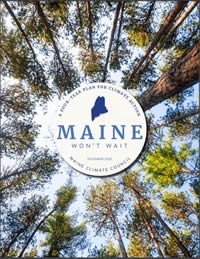Home → Sustainability → Climate → Adaptation Actions
Adaptation Actions
- Adaptation Overview
- What are the most common natural hazards in Maine? Topic Specific Toolkits
- What is being done to prepare for and adapt to impacts and effects from climate change?
- Groups, Activities, and Updates
- Case Studies
- Flood: Riverine, Flash or Urban
- Severe Winter Storms
- Severe Summer Storms
- Hurricane
- Wildfire
- Drought
- Earthquake
- Tornado
- Erosion/Coastal Erosion
- Landslide
- State Energy Analysis Tool
- State and Local Adaptation Plans
- Governors’ Climate Resilience Playbook
Adaptation is adjustment in natural or human systems that effectively use beneficial opportunities or reduce negative effects due to a changing climate.
Resilience is a capability to prepare for, respond to, and rapidly recover from significant hazard events with minimum damage to social well-being, the economy, and the environment.
“It is important for Maine to assess the value of avoided losses as well as additional costs when calculating the risks and benefits of climate adaptation actions. There is every reason to think that real saving will arise from avoided costs due to adaptation, and that new opportunities resulting from adaptation actions will have a major positive effect on Maine’s economy.”
Recommendations from Maine’s Phase I Climate Adaptation Plan, People and Nature, Adapting to a Changing Climate: Charting Maine’s Course 2010.
What are the most common natural hazards in Maine?
More information contained on the Maine Prepares website for the most common natural hazards in Maine.
Topic Specific Toolkits
The Maine Adaptation Toolkit was developed to aid climate adaptation efforts through providing a centralized source to go to for the information you might need for designing and implementing adaptation measures or strategies, as well as information on important regulations and standards to integrate into your project or planning process. The toolkit also contains opportunities to connect with state and other engaged practitioners for technical expertise.
Click here to access Maine’s Adaptation Toolkit
What is being done to prepare for and adapt to impacts and effects from climate change?

Maine Won't Wait, A Four-year Plan for Climate Action, December 2020
The 2020 Maine Won't Wait Climate Action Plan is the product of the Maine Climate Council, supported by six working groups and two subcommittees that began work in September 2019.
Key Finding:
Beyond reducing greenhouse gas emissions, the Plan also focuses on several other key goals. First is creating economic opportunity as we undertake climate and energy transitions. Second is preparing our communities, people, and economy for the impacts of climate change like rising sea levels, increased flooding, and changing weather conditions. And finally, to advance equity as we undertake this work, to ensure communities and citizens who are often left behind can benefit from climate solutions by having access to opportunities and protection from threats. (p 6-7)
Quick History of Climate Adaptation and Preparedness Work in Maine…
1987 |
MEMA / DECD / SPO |
|
1995 |
Anticipatory Planning for Sea-Level Rise Along the Coast of Maine |
EPA |
2007 |
Protecting Maine’s Beaches for the Future |
DACF |
2009 |
LD 460 “Resolve to Evaluate Climate Change Adaptation Options for the State” |
124th Legislature |
2009 |
U. Maine |
|
2010 |
Maine Climate Action Plan People and nature, Adapting to a Changing Climate [Summary of the Report, PDF] |
DEP |
2013 |
Thirteenth State Hazard Mitigation Plan |
MEMA |
2014 |
Monitoring, Mapping, Modeling, Mitigation and Messaging: Maine Prepares for Climate Change |
EERWG |
2015 |
U. Maine |
|
2017 |
DEP |
|
2018 |
MEMA |
|
2018 |
Maine Prepares for Climate Change, 2018 Update |
MICA |
| 2018 | Regional Climate Adaptation Planning | NEG/ECP |
2018 |
U. Maine |
|
2019 |
Maine Prepares for Climate Change, 2019 Update |
MICA |
| 2019 | Ocean and Coastal Acidification Planning Report An Action Plan to Address Ocean Climate Change in Maine | MOCA |
| 2020 | Maine Climate Action Plan Maine Won’t Wait, A Four Year Plan for Climate Action | MCC |
| 2021 | Maine Climate Action Plan Maine Won’t Wait, A Four-Year Plan for Climate Action One-Year Progress Report | MCC |
| 2022 | Analyze the Impact of Sea Level Rise | Interagency |
Groups, Activities, and Updates
External hyperlinks are intended to provide Maine-specific information that might assist your efforts. Inclusion does not constitute endorsement by the Maine Department of Environmental Protection of the linked web sites, or the information, products or services contained therein.
Casco Bay Estuary Partnership
http://www.cascobayestuary.org/
Climate Smart Land Network (CSLN)
http://climatesmartnetwork.org/
Gulf of Maine Climate Council Network
Climate Network: http://www.gulfofmaine.org/public/climate-network/
Gulf of Maine Research Institute (GMRI)
https://www.gmri.org/commitments/strategic-initiatives/climate-center/
Island Institute
http://www.islandinstitute.org/
Maine Climate Change Adaptation Providers Network
https://extension.umaine.edu/climatesolutions/
http://www.mcht.org/
Maine Ocean Acidification Partnership
https://seagrant.umaine.edu/extension/maine-ocean-and-coastal-acidification-partnership-moca/
Maine Silver Jackets
http://silverjackets.nfrmp.us/State-Teams/Maine
New England Interstate Water Pollution Control Commission (NEIWPCC)
http://neiwpcc.org/our-programs/climate-change/
New England Federal Partners
https://toolkit.climate.gov/NEFP
New England Municipal Sustainability Network
https://www.nemsnetwork.org/
Northeastern Regional Association of Coastal and Ocean Observing Systems
http://neracoos.org/
Northeast Coastal Acidification Network
http://www.necan.org/
Northeast Regional Ocean Council (NROC)
http://northeastoceancouncil.org/
Regional Association for Research on the Gulf of Maine (RARGOM)
http://www.rargom.org/
New England Governors and Eastern Canadian Premiers
https://www.coneg.org/adaptation-working-group/ Adaptation Working Group
https://www.coneg.org/neg-ecp/committees/ecological-connectivity-working-group/ Ecological Connectivity Working Group
US Climate Alliance
https://www.usclimatealliance.org/
Case Studies & Updates
Maine / Region
Maine Climate News University of Maine Climate Change Institute
Seasonal weather and climate updates, weather data and climate patterns
Maine Climate Solutions Map Climate Solutions Maine
Active organizations in Maine working on adaptation and mitigation actions
Climate Ready Estuaries Partner Projects US Environmental Protection Agency
Resilience and Adaptation in New England (RAINE), US Environmental Protection Agency
Case studies around New England
U.S. Climate Resilience Toolkit
National / International
Climate Forum Yale University
Georgetown Climate Center Georgetown University
State level plans and implementation actions on mitigation and adaptation
CAKE-X Climate and Adaptation Knowledge Exchange
Climate Resources United States Climate Alliance
Eco-Adapt Eco-Adapt
Resilience Dialogues the Kresge Foundation